Maintaining a thriving garden is undoubtedly rewarding, but pests can quickly turn your green sanctuary into a battlefield. Chemical pesticides may offer quick results, but they often come with harmful side effects for the environment, beneficial insects, and even your health.
For those who prefer an organic approach, homemade pesticides for plants provide an effective, affordable, and eco-friendly solution to keeping unwanted pests at bay. This comprehensive guide will walk you through some of the best homemade pesticides, detailing their benefits, ingredients, and application methods.
Whether you’re a home gardener, plant enthusiast, or dedicated organic grower, these natural solutions will help you maintain a pest-free garden while promoting a healthier ecosystem. From simple kitchen ingredients to powerful herbal remedies, you’ll find everything you need to protect your plants safely and sustainably.
Why Choose Homemade Pesticides?
Commercial pesticides often come with a long list of chemicals that can harm the environment, beneficial insects, and even your health. These synthetic pesticides may offer quick results, but their long-term effects can be detrimental to soil fertility, water quality, and overall garden biodiversity.
Overuse of chemical pesticides can also lead to pesticide resistance, making pest control even more challenging over time. Homemade Pesticides For Plants provide a safer, more sustainable alternative, allowing you to control what goes into your garden while being cost-effective and easy to prepare.
By using natural ingredients commonly found in your kitchen or local store—such as garlic, neem oil, chili, vinegar, and soap—you can effectively combat pests without compromising the health of your soil, plants, and surrounding ecosystem.
These eco-friendly solutions break down naturally, reducing the risk of toxic buildup and ensuring a healthier, more balanced garden. Plus, making your own pesticides empowers you to adopt a more organic gardening approach, promoting long-term plant health and environmental sustainability.
Homemade Pesticides to Try
1. Soap and Water Solution
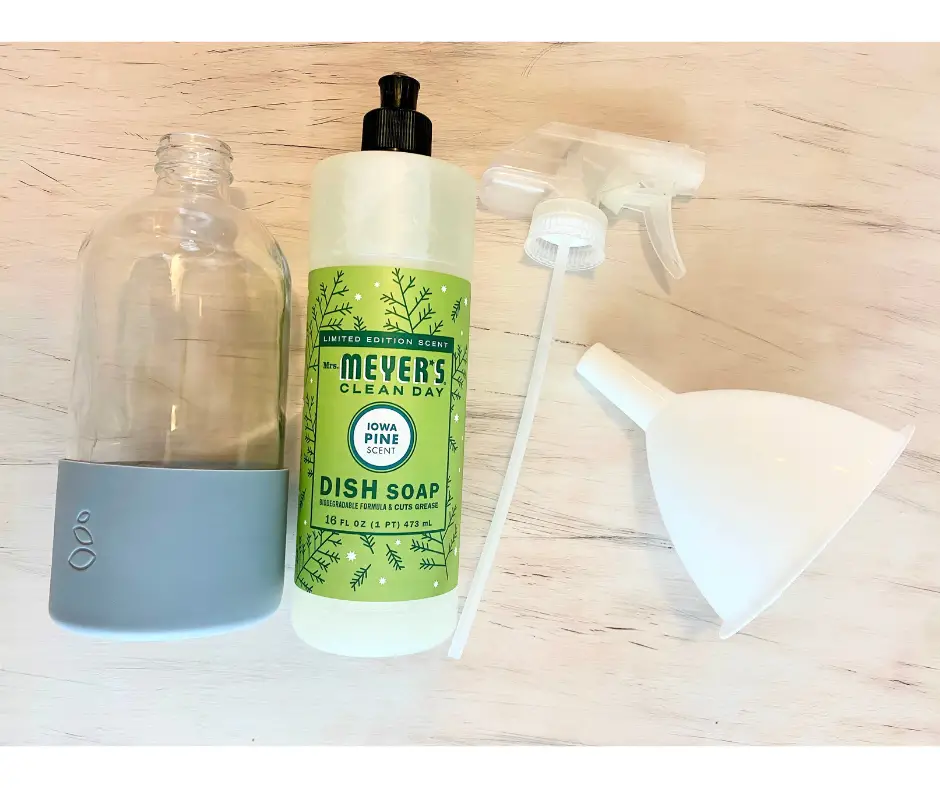
Target pests: Aphids, mites, whiteflies
Soap and water is one of the simplest yet most effective homemade pesticides for plants. This natural insecticide works by breaking down the protective outer layer of soft-bodied pests, causing them to dehydrate and die.
Unlike chemical pesticides, it doesn’t leave harmful residues, making it safe for beneficial insects when applied correctly.
What You’ll Need:
- 1 tablespoon of dish soap (avoid antibacterial soap or degreasers)
- 1 quart of water
- Spray bottle
How to Use It:
- Combine the soap and water in the spray bottle.
- Shake well to mix the solution thoroughly.
- Spray directly onto infested areas of the plant, focusing on the undersides of leaves where pests often hide.
- Reapply every few days as needed, especially after rain or watering.
For best results, use this spray in the early morning or late evening to prevent leaf burn from the sun. Regular application can help keep your plants pest-free without the risks associated with chemical pesticides.
2. Garlic Spray
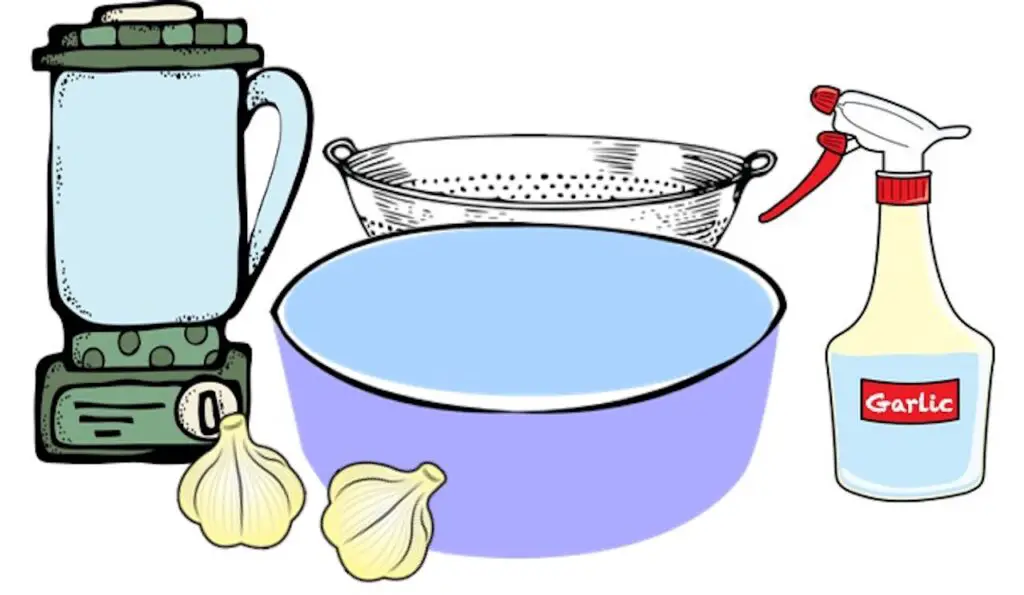
Target pests: Mosquitoes, caterpillars, beetles
Garlic is a powerful natural pest deterrent due to its strong odor and sulfur compounds, which repel many crawling and flying insects. It works by creating an unappealing environment for pests, preventing them from feeding on your plants.
This organic solution is not only effective but also safe for the environment, making it a great addition to your arsenal of homemade pesticides for plants.
What You’ll Need:
- 2 heads of garlic
- 4 cups of water
- 2 tablespoons of vegetable oil (helps the spray stick to leaves)
- 1 teaspoon of dish soap (enhances effectiveness)
- Spray bottle
How to Use It:
- Peel and blend the garlic with water until smooth.
- Add the vegetable oil and dish soap to the mixture.
- Allow the solution to steep overnight to maximize potency.
- Strain the mixture to remove solid bits, then pour the liquid into a spray bottle.
- Spray directly onto plant leaves, focusing on affected areas and the undersides of leaves.
For best results, apply the spray in the early morning or late evening to prevent leaf burn from direct sunlight. Reapply every few days or after rainfall to maintain its effectiveness. This natural repellent helps keep pests at bay while ensuring your garden stays healthy and chemical-free.
Related Topics:
3. Neem Oil Spray

Target pests: Aphids, scale, mealybugs, leaf miners
Neem oil, extracted from the seeds of the neem tree, is one of the most effective homemade pesticides for plants. It works by disrupting the feeding, growth, and reproduction of pests, making it a powerful yet natural alternative to chemical pesticides.
Additionally, neem oil has antifungal properties that help prevent plant diseases like powdery mildew and rust. When used correctly, it is safe for beneficial insects such as bees and ladybugs.
What You’ll Need:
- 2 teaspoons of pure neem oil (cold-pressed for best results)
- 1 teaspoon of dish soap (helps emulsify the oil)
- 1 quart of warm water
- Spray bottle
How to Use It:
- Mix the neem oil, dish soap, and warm water in the spray bottle.
- Shake thoroughly to ensure the oil disperses evenly.
- Spray directly onto affected plants, coating the tops and undersides of leaves where pests hide.
- Apply every 7–14 days or after heavy rain for the best results.
For best effectiveness, apply neem oil spray in the early morning or late evening to prevent leaf burn. Avoid using it in direct sunlight or extreme heat, as this may cause plant stress. Regular use can help protect your plants from infestations while maintaining a balanced garden ecosystem.
4. Chili Pepper Spray
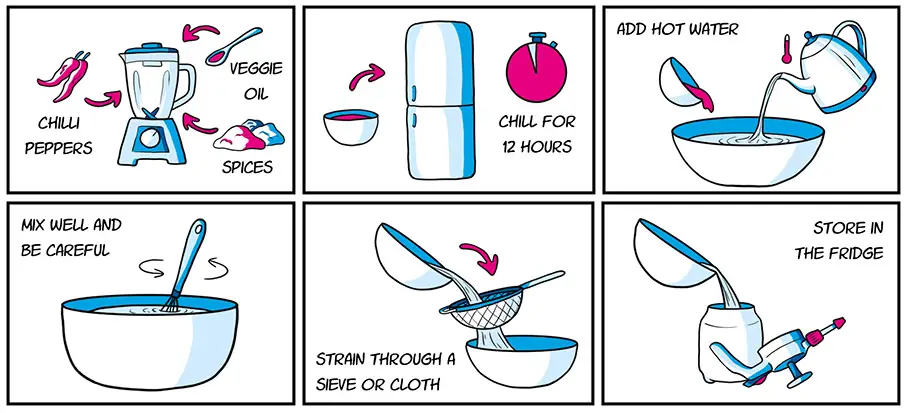
Target pests: Ants, aphids, beetles
Chili peppers contain capsaicin, a natural compound that irritates pests and deters them from feeding on your plants. This spicy homemade pesticide is an excellent way to protect your garden from common insect invaders without using harmful chemicals.
Plus, it’s an easy and affordable addition to your collection of homemade pesticides for plants.
What You’ll Need:
- 1 tablespoon of dried chili powder or 2 fresh chili peppers
- 1 quart of water
- 1 teaspoon of dish soap (helps the spray adhere to leaves)
- Spray bottle
How to Use It:
- Boil the chili peppers in water for about 10 minutes to release their natural compounds.
- Let the mixture cool completely.
- Add the dish soap and stir well.
- Strain the liquid to remove solid bits and pour it into a spray bottle.
- Spray directly onto plant leaves, focusing on areas where pests are active.
Caution: Wear gloves while handling chili peppers and avoid contact with your eyes, nose, and skin. The spray can be irritating, so apply it carefully.
Reapply every few days or after rain for continued protection. This spicy deterrent is a great natural solution to keep your plants safe from unwanted pests!
5. Coffee Grounds
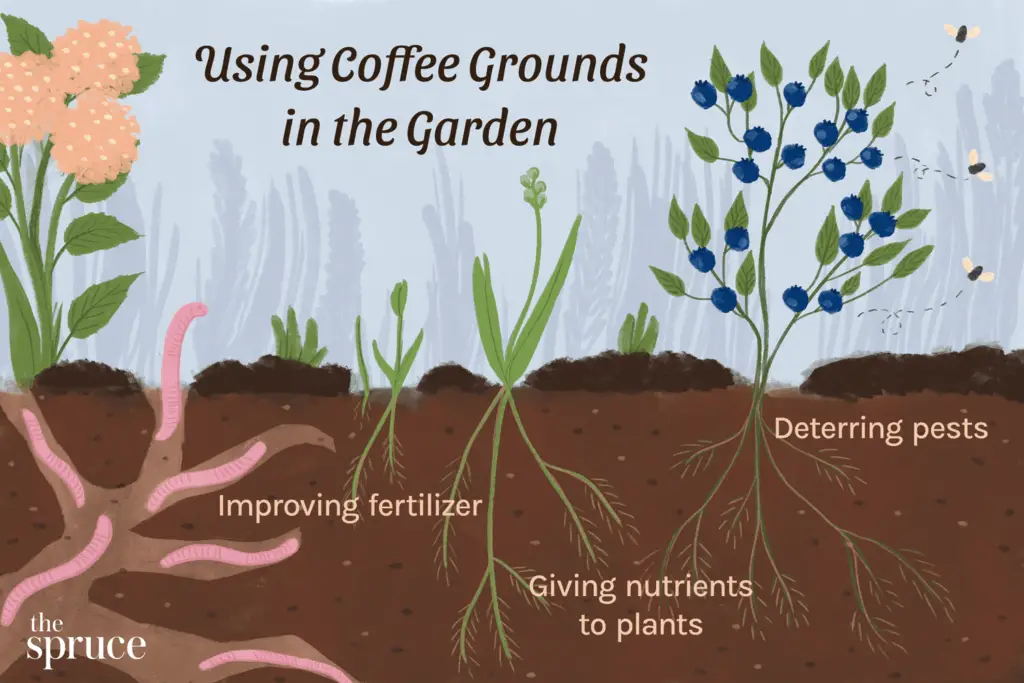
Target pests: Slugs, snails, ants
Used coffee grounds are an excellent natural pest repellent while also enriching the soil with organic matter. Their strong scent and slightly acidic nature help keep unwanted pests at bay, making them a simple yet effective addition to your homemade pesticides for plants.
Additionally, coffee grounds improve soil drainage and add valuable nutrients like nitrogen, promoting healthy plant growth.
What You’ll Need:
- Used coffee grounds
How to Use It:
- Let the used coffee grounds dry to prevent mold.
- Scatter them around the base of your plants, forming a protective barrier against slugs and snails.
- Reapply as needed, especially after heavy rainfall or watering.
For added effectiveness, you can mix coffee grounds into compost or soil to improve plant health while naturally deterring pests. This eco-friendly method is a great way to recycle kitchen waste while protecting your garden!
6. Vinegar Solution
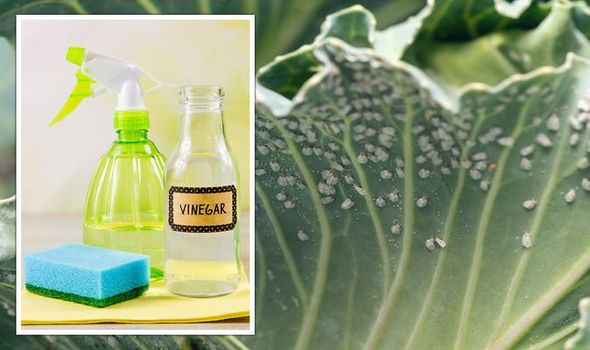
Target pests: Ants, fruit flies, and some fungi
Vinegar is a powerful natural remedy that works as both an insect repellent and a mild fungicide. Its high acidity disrupts the life cycle of pests and can kill certain insects on contact. When used carefully, it can be an effective addition to your homemade pesticides for plants.
However, since vinegar is acidic, overuse can damage plants, so it’s best applied sparingly and strategically.
What You’ll Need:
- 1 cup of vinegar (white or apple cider)
- 3 cups of water
- 1 teaspoon of dish soap (helps the solution adhere to surfaces)
- Spray bottle
How to Use It:
- Mix the vinegar, water, and dish soap thoroughly in a spray bottle.
- Shake well before each use.
- Lightly spray affected areas of plants, focusing on areas where pests are present.
- Avoid excessive application, especially on delicate foliage, as vinegar can burn plant leaves.
Caution: Test the solution on a small section of your plant before full application. If no damage occurs within 24 hours, proceed with a wider application. Reapply as needed, but use with caution to prevent plant stress.
This natural pesticide is particularly useful for controlling ant infestations and repelling fruit flies while offering mild antifungal benefits to your garden.
7. Diatomaceous Earth
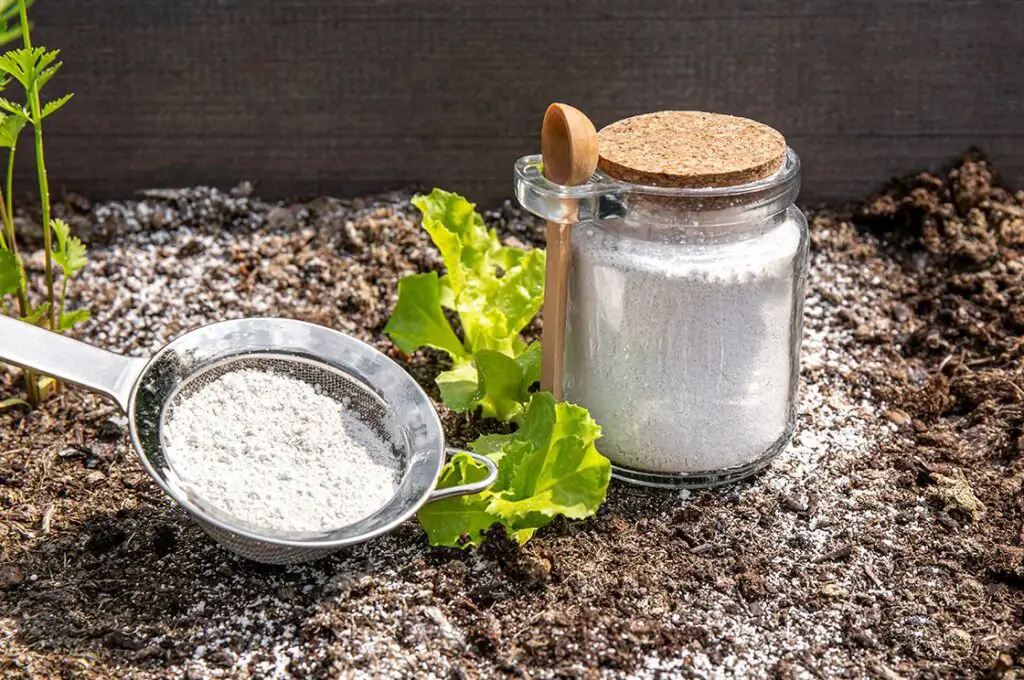
Target pests: Slugs, beetles, fleas
Diatomaceous earth (DE) is a natural, mineral-based pesticide made from the fossilized remains of tiny aquatic organisms called diatoms. Its fine, powdery texture may seem harmless, but to pests, it acts like tiny shards of glass, piercing their exoskeletons and causing dehydration.
As one of the safest homemade pesticides for plants, DE is non-toxic to humans, pets, and beneficial insects when applied correctly.
What You’ll Need:
- Food-grade diatomaceous earth
How to Use It:
- Lightly sprinkle the powder around the base of your plants to create a protective barrier.
- Apply directly onto pests or areas where they are commonly seen.
- Reapply after heavy rain or watering, as moisture reduces its effectiveness.
- Use caution when applying on windy days, as the fine particles can be easily blown away.
Caution: Always use food-grade diatomaceous earth, as industrial-grade versions are not safe for gardens. Avoid inhaling the fine powder, as it can irritate the lungs.
This natural solution is highly effective against crawling insects while being environmentally friendly, making it a valuable tool in organic gardening!
Tips for Using Homemade Pesticides Safely
Using homemade pesticides for plants is a great way to protect your garden naturally, but safety is key to ensuring your plants—and yourself—stay healthy. Follow these essential tips for effective and responsible use:
- Test First: Always test a small amount of any homemade pesticide on a single leaf before applying it to the entire plant. Wait 24 hours and check for any adverse reactions, such as leaf discoloration or wilting.
- Apply in the Morning or Evening: Avoid spraying plants during the heat of the day, as intense sunlight combined with liquid sprays can cause leaf burn. Early morning or late evening applications are best for absorption and effectiveness.
- Wash Edible Plants: If you’re treating fruits, vegetables, or herbs, always rinse them thoroughly before consuming to remove any residue from the homemade pesticide.
- Wear Protective Gear: When handling strong solutions like chili pepper spray or garlic spray, wear gloves and avoid touching your face, eyes, or skin to prevent irritation.
- Store Properly: Some homemade pesticides can lose potency over time. Always label and store leftover solutions in a cool, dark place, and make fresh batches as needed for maximum effectiveness.
By following these guidelines, you can ensure your homemade pesticides remain safe, effective, and eco-friendly while keeping your plants pest-free!
The Benefits of Going Homemade
Using homemade pesticides for plants offers more than just pest control—it provides a range of advantages that contribute to a healthier garden and environment. Here’s why making your own pesticide solutions is a smart choice:
- Eco-Friendly: Homemade pesticides reduce reliance on synthetic chemicals, preventing harmful residues from contaminating the soil, water, and surrounding ecosystem. This helps maintain a balanced, sustainable garden.
- Cost-Effective: Most homemade pesticide ingredients, such as vinegar, garlic, and soap, are already available in your kitchen. This saves you money compared to expensive store-bought pesticides.
- Safe for Beneficial Insects: Unlike many commercial pesticides, homemade solutions are less likely to harm important pollinators like bees, butterflies, and ladybugs, ensuring a thriving garden ecosystem.
- Healthier Plants & Produce: With no harsh chemicals involved, your fruits, vegetables, and herbs remain safe for consumption, reducing the risk of pesticide exposure for you and your family.
- Customizable & Versatile: You can adjust homemade pesticide recipes based on the specific pests in your garden, making them more effective while minimizing unwanted side effects.
By choosing homemade solutions, you’re taking a natural, sustainable, and budget-friendly approach to pest control—keeping your plants healthy while protecting the environment.
Grow Happier, Healthier Plants Naturally
Protecting your plants doesn’t have to involve harmful chemicals or costly solutions. With the homemade pesticides for plants outlined above, you can effectively manage pests while keeping your garden eco-friendly and chemical-free.
Remember, the key to success is consistency—regularly inspect your plants for signs of pests and apply these natural remedies as needed. By staying proactive, you can prevent infestations before they become a serious problem.
Start experimenting with these simple solutions today and enjoy the satisfaction of a healthy, thriving, and pest-free garden—all while protecting the environment!
Happy gardening!
FAQs:
1. Are homemade pesticides safe for all plants?
Most homemade pesticides are gentle on plants, but some ingredients, like vinegar or strong soap solutions, can be harsh. Always test a small amount on a single leaf and wait 24 hours before applying to the entire plant.
2. How often should I apply homemade pesticides?
The frequency depends on the severity of the pest problem. For maintenance, apply once every 7–14 days. For active infestations, reapply every few days until pests are under control.
3. Will homemade pesticides harm beneficial insects like bees and ladybugs?
Many homemade solutions, like neem oil and coffee grounds, are safe for pollinators when applied correctly. To minimize risk, spray pesticides early in the morning or late in the evening when beneficial insects are less active.
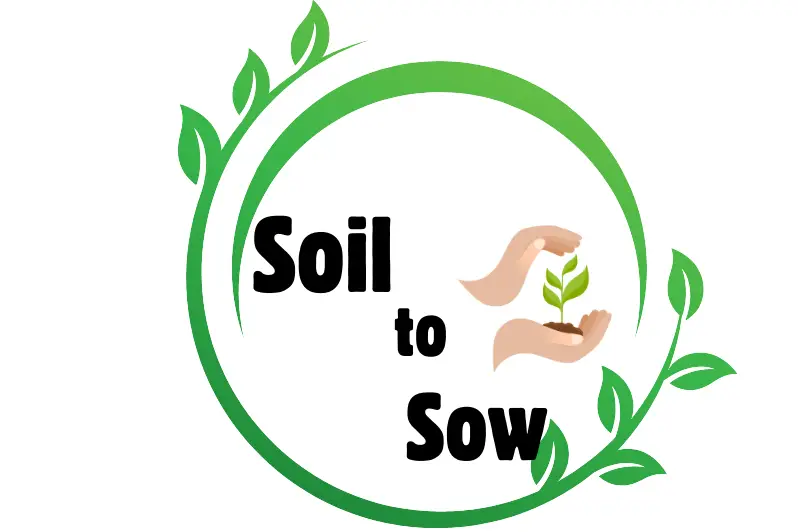

2 thoughts on “Homemade Pesticides for Plants: A Complete Guide!”